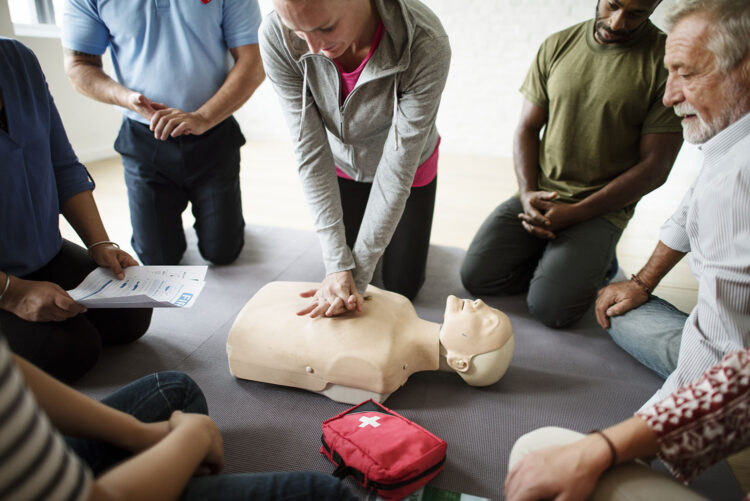Promoting a positive mindset in the workplace is a great way to keep employee satisfaction high and create an inclusive environment. To help your workplace boost morale, we will reveal five mental health first aid strategies that can positively impact staff members.
Mental Health First Aid (MHFA) educates people on assisting others experiencing mental health issues.
While MHFA does not allow people to diagnose or treat mental health issues, it gives them the knowledge to assist someone until professional help is available.
The four primary goals of MHFA are to create a sense of safety, listen to those in need without judgment, form supportive connections, and provide reassurance and accurate information.
Implementing these goals with mental health first aid strategies can help workplaces feel more inclusive and improve the general well-being of staff.
1. Enlisting a Mental Health First Aid Officer

MHFA Officers are trained individuals qualified to help people suffering from mental health issues. To become an MHFA Officer, you must complete a nationally accredited course. MHFA Officer certificates must be renewed every three years.
Assigning an MHFA Officer to your office will allow fellow employees to reach out for immediate mental health assistance or a confidential conversation.
Also, staff members can contact MHFA Officers to request informal support that does not require them to alert managers or the human resources department. These officers can be used to support employee assistance programs as well.
Even though they are extremely helpful, MHFA Officers cannot offer counseling, mediate disputes, diagnose mental illnesses, or replace human resources. However, they can refer people to mental health professionals for further assistance.
2. Creating a Mental Health Recovery Room
An accessible area that can help people temporarily recover from a stressful day at work or a sudden mental health event will increase your office’s morale.
Mental health recovery rooms, also known as wellness rooms, offer staff a private space to relax if they feel ill or need to make emergency phone calls too.
Many of these rooms will include comfortable seating, a bed for people who require immediate rest, a child change room for parents of infants, and tranquil music to create a peaceful setting.
Additionally, mental health recovery rooms may feature a television or smart device to complete interactive exercises.
These exercises allow employees to alleviate stress and practice mindfulness, increasing their productivity throughout the day. Having a dedicated mental health room will help fellow employees become more productive, increase mental well-being and improve staff retention.
3. Introduce Recurring Team Building Activities

Team-building exercises create supportive connections between employees and can improve staff members’ mental health.
Forming an inclusive environment encourages trust and reduces employee stress, which is why team-building activities are important.
These activities have many variations and can be used to promote gratitude, highlight strengths, understand different communication, and deal with emotions constructively.
For example, a team-building exercise that requires each member of an office to talk openly about their feelings and ambitions would help staff improve their ability to listen without judgment.
Although several exercises can be completed inside the office, off-site activities like rock climbing, water sports, and luncheons will allow employees to explore common interests and relieve stress.
Hosting continuous team-building activities will help your colleagues recover from stressful periods and understand each other better. Regardless of the exercise, team-building activities encourage positive mental health and should be a common practice in every workplace.
4. Offer Workplace Counselling Services
Workplace counseling support allows employees to receive quick treatment for various mental health issues.
Employee Assistance Programs (EAPs) often include this practice, ensuring staff can access counseling services easily and confidentially.
Some EAPs offer family members of employees the opportunity to access counseling, giving staff members peace of mind about the mental well-being of their loved ones.
Trauma management services should also be available to ensure that employees suffering from a severe mental health incident can get the immediate help they need.
If employees want an alternative service, offices should provide a list of reputable organizations they can access for support. Workplace counseling sessions will help your colleagues maintain a sound mind and assure them that help is always available in difficult times.
5. Host Frequent Mental Health Information Sessions

Mental health information sessions are a great way to educate your staff on current research and teach them mindfulness techniques. Learning these techniques will help them navigate stressful situations and build emotional resilience.
Workplaces wanting to provide these sessions should contact reputable organizations to host them. A mental health professional facilitating the session would allow staff members to receive information from verified sources.
Employees must have the option to attend these sessions regularly so their mental health knowledge remains fresh and they can learn new techniques that are relevant to their lives.
All workplaces should prioritize mental health education as it helps staff members understand their minds and allows them to reach out for additional help if needed.
Including mental health information sessions, your colleagues should be encouraged to take the MHFA Course and develop a greater understanding of mental health. Take your first step to becoming qualified in mental health first aid with First Aid Pro’s nationally accredited courses.
This training course will help you identify mental illnesses in the workplace and offer immediate assistance during mental health emergencies until medical professionals arrive.
Available across several Australian locations, including on-site workplace training options, the Mental Health First Aid Course has two formats. Users can take the 12-hour version of the course, which includes two six-hour sessions over two days. Alternatively, people wanting to take the longer two-week format must attend one six-hour session for both weeks.
Many mental health topics are covered throughout the course, such as managing suicidal thoughts and behaviors, panic attacks, extreme psychotic states, alcohol and drug abuse, traumatic experiences, and aggression.
First Aid Pro’s course requires no previous MHFA training or knowledge, allowing the classes to remain inclusive and relevant to current mental health research.
Register today by following the link above, and begin creating a positive work environment that values mental well-being.
 Hi Boox Popular Magazine 2024
Hi Boox Popular Magazine 2024



